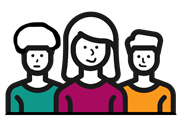When we are young the friendships we make are important, some will last a lifetime and others will last for a short while.
All of our relationships; the ones that go well and the ones that are tricky, help us learn about ourselves and others. Friendships teach us how to cooperate with different people, and how to deal with disagreements, and different opinions. Friendships teach us kindness and to care for others.
The way children make and behave in friendships will depend on their age, experience and personality. Parents can support children by helping them think about how they can have good friends and be a good friend.
When friends argue, and if friendships come to an end - it can be really painful however old we are. For children and young people worries and upsets in friendships are common. They are all learning together about how to manage their feelings and how to get along with different people and sometimes it goes wrong!
At Home
Children learn a lot about how to respect and treat others well from their family life. This good influence will help them build positive relationships outside the home too.
You can help by;
 Speaking to each other kindly.
Speaking to each other kindly.Making Friends
Children who feel good about themselves will find it easier to make friends. They will find it easier to manage the ups and downs that happen in all relationships.
Sometimes children need to ‘practice’ the skills they need to build good friendships. They help because children will experience:
Some children will go into school or a new environment and quickly make lots of friends. Some take longer to build friendships and have just a couple of people they get close to. This depends on your child’s personality and experiences. Your child does not have to have a lot of friends, but friendship is good for our mental health and it makes us feel happy.
Your Own Worries
Children are not all the same in what they need, or enjoy. You may have struggled to make friends at school, or maybe you were the centre of attention. Your child’s needs are individual and may be different from yours.
Try not to show your child your worries as this could add to the pressure they feel. Relax and your child will most probably make friendships that work for them.
Pre-School & Reception
Children don’t really start playing ‘together’ until they are about two and a half. Until then they play near each other rather than with each other. In pre-school and reception they are still ‘beginners’ at building friendships.
Some children may find it easier than others; they may be used to loud, busy families. Some may have been used to being around other children at nursery for a long time. Others may not have spent much time away from their parents.
In addition, all of us have different personalities and levels of confidence. Some children will want to take friendship making more slowly than others. This is fine.
Try not to worry - your child will have plenty of time to learn how to be friends. There are some ways you can help your child gain confidence to make, and be, a good friend.
All children have some days when they might feel a bit left out and lonely. Comfort and reassure them and help them think what they could try tomorrow.
Even young children sometimes say unkind things to each other. Some children are more bothered by this than others. They are often back to playing with each other again soon after. Encourage your child to say ‘you are hurting my feelings’ and then walk away from children that are not being kind. Reassure them that it is normal to have some tough days with friends and they don’t need to get along with everyone.
If your child seems to be struggling with friendships talk to their pre-school / school. They will be able to give you a picture of what they see happening. They will be able to help your child develop their social skills.
Throughout their childhood your child will continue to be learning how to get along with others.
You can help your child to make friends and also be a good friend. Talk to them about what they think makes a healthy friendship.
During these years children will start to have friendship groups that are important to them.
If your child is a bit slower at making friends they can feel left out and a bit lonely. Even if your child has made friends this is still often a time when friendships are tricky and cause upset. They are still developing socially and emotionally and will sometimes need your help to think things through.
If your child does not make friends easily;
 The move to high school can be an unsettling time. Friends may not be going to the same school. Everyone is a bit nervous and worried about being in different classes with different people. It can be really hard to see your child struggling to make friends. It is not easy to see them upset and sad if there are arguments, or if there is meanness in the group.
The move to high school can be an unsettling time. Friends may not be going to the same school. Everyone is a bit nervous and worried about being in different classes with different people. It can be really hard to see your child struggling to make friends. It is not easy to see them upset and sad if there are arguments, or if there is meanness in the group.
You can help them understand how to be a good friend. The social skills they learn as children will help them throughout their lives.
Worries About High School
Share any worries you had at that age and how you coped. Take care not to pass on anxieties left over from any bad experiences – this is a clean slate for your child.
Speak to the school they are moving to. They are used to supporting young people to make friends. They will be able to explain how they can help to you and your child.
Is there an existing friend that is starting the new school too? Talking with a friend in the same situation can show them it is ‘normal’ to have some nerves.
Secondary School
Friendships and building relationships are an important part of life. As your child get older, friends have more and more importance for them.
Making friends may be a worry for your child. They may have found making friends hard before, or had difficult experiences with friends in the past. Reassure your child that most people will feel worried about this when they are facing a new set of people.
You can help your child build their confidence by talking about friendships and thinking what could help them feel more confident to meet new people and make friends. Help your child keep in touch with friends on the phone or online apps so they can support each other.
 Practise some opening lines to help them get the conversation started. ‘I like your scarf’ or ‘what do you like doing after school.’
Practise some opening lines to help them get the conversation started. ‘I like your scarf’ or ‘what do you like doing after school.’Talk to your child about body language. We can give off signals to make us seem like a person it would be good to talk to. Our own and other people’s body language say a lot about us.
It can be hard when you are feeling worried to give off the body language that says you want to talk. Your child can try taking a few slow deep breaths as they smile to help them feel ready to meet people.
Joining groups and clubs is a good way to meet new people with common interests. It offers a change of scenery and new environments for your child. Check what is available through school or locally to where you live.
Teenagers
As your child gets older and into their teens, friends will start to have more and more influence over them. This is a natural part of development.
Your child might starting want to more spend time with friends, than at home or with family. It is important to keep in the loop of who your child spends time with and what they do together.
Keep boundaries and rules in place. Even if they tell you ‘none of my friends have to do that’. You know your child best and what level of independence they can cope with. Make sure you know where they are and who they are with.
Finding out what you can about who your teenager hangs out with can be reassuring.
All friendships have ups and downs. Young people are learning this through the relationships they are building. Friendships are good for our confidence and self esteem.
Friendship Groups
Some children find groups difficult – they might be thought of as ‘shy’ or they might have additional needs that mean they find a big group harder to manage. You can still help your child to gain confidence and skills in making friends.
 Together think through what makes a good friend – being kind and interested in what others say and do.
Together think through what makes a good friend – being kind and interested in what others say and do.Difficult Friendships
It can be difficult to see your child upset, sad or worried because it might remind you of difficult experiences you have had. The temptation can be to jump in and try and fix it for your child, maybe calling school, or the other children’s parents.
Sometimes this is absolutely necessary. For instance, if your child tells you about something risky that has happened or they disclose bullying that is affecting their mental health. Schools are used to supporting children with friendship difficulties.
For most arguments and fallouts this may not be the best first step.
Your child can learn valuable lessons about how to work at relationships. They can learn when a friendship is unhealthy and they need to walk away. With your support your child will often be able to deal with their friendship difficulties themselves.
Supporting Your Child
You can help your child deal with friendship challenges by helping them build self esteem, confidence and resilience.
If you find out that your child is being bullied, or has been involved in bullying someone else it is important to try and stay calm and find out the facts.
Friendship Problems
It is common for friendship groups to change over time. Interests and points of view change as children grow and develop. It can be hard to watch your child work out which friendships are working and which have ‘run their course’.
Children sometimes make friends and then fall out again for a short time. Many different groupings and re-groupings happen, especially as interests and experiences change over time.
If your child is having a hard time with a friend you can help them by keeping calm and listening to what they say. This will give them the space to think through what has happened. Don’t feel you have to fix the problem - letting them talk is helpful in itself.
If you find out that your child is being bullied, or has been involved in bullying someone else it is important to try and stay calm and find out the facts.
You can contact the Healthy Child Service team by calling Just One Number on 0300 300 0123 or texting Parentline on 07520 631 590. Our opening hours are Monday to Friday, 9am to 5pm (excluding bank holidays).
If your child is 11-24 years old, FYI Norfolk is an interactive NHS website just for them. It provides reliable and trustworthy advice and support on lots of health and wellbeing topics.
For 10 to 18-year-olds, Kooth is a free, confidential and safe way to receive online counselling, advice and emotional well-being support.
Childline - Children and young people under 19 can call 0800 1111 for free support.
Young Minds Parents Helpline - Call 0808 802 5544 for free Mon-Fri from 9.30am to 4pm.